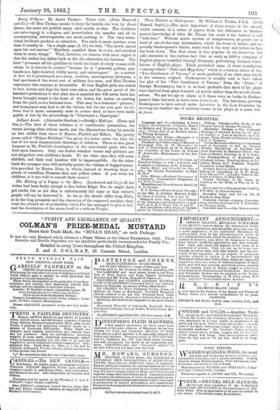Barry O'Byrne. By Annie Thomas. Three vole. (John Maxwell and
Co.)—If Miss Thomas means to keep the laurels she won by Denis Dense, she must not publish many such novels as this. The incidents are extravagait to a degree, and nevertheless the murder and all its accompanying extravagancies are made nothing of. The very sensa- tional incidents produce no sensation. The style is more careless oven than it usually is On a single page (L 78) we find, "The howls jarred upon his oral nerves," "Kathleen equalled them in every, and excelled them in most, things." What, however, we observe with most regret is that the author has fallen back on the old admiration for fastness. The hero "possesses all the qualities to touch the heart of every woman with whom he is thrown in contact" because he is "graceful, gallant, gay, handsome, light-hearted, wildly merry, and extravagant." As a matter of fact he is pourtrayed as a noisy, reckless, unscrupulous Irishman, a bad specimen of the worst sort of military fast man, and Miss Thomas represents this creature as irresistible. So true English girls are stated to love horses and dogs for their own sakes, and the great proof of the heroine's perfections is that after she is married she will never have her horse brought round to the front of the house, but insists on starting from the yard, as her husband does. This may be a feminine "picture," and horseyness may lead to all the virtues, but for our own part we be- lieve that it more commonly ends in scenes such as have been made public of late by the proceedings in " Chetwynd v. Chetwynd."
































 Previous page
Previous page